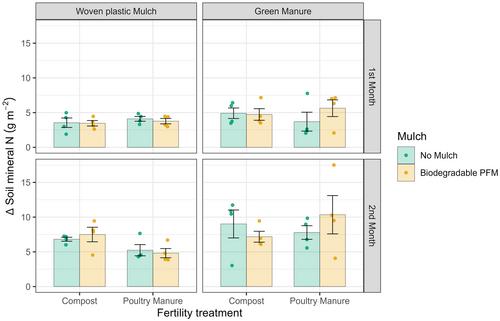Biodegradable plastic film mulch increases the mineralisation of organic amendments and prevents nitrate leaching during the growing season in organic vegetable production
Abstract
Introduction
Organic vegetable production relies on inputs of organic forms of nitrogen (N). This presents a challenge as it needs to be mineralised by the soil microbial community. Difficulties matching the timing and rate of organic N amendments to crop demand could potentially lead to high rates of nitrate leaching. The use of plastic film mulch (PFM) has the potential to increase crop yield, accelerate N mineralisation, reduce rainfall infiltration and therefore N leaching. Biodegradable PFM reduces the risk of contaminating soil with plastics. Although these positive effects have been proven in major conventionally grown commodity crops, the effects of PFMs are poorly understood in organic vegetable crops, particularly in moist temperate climates prone to N losses via winter leaching.
Materials & Methods
Our plot-scale field experiment attempted to quantify the effect of biodegradable PFM on N leaching and N mineralisation in organic lettuce production in the presence and absence of biodegradable PFM. It took place in one season within a longer-term experimental organic vegetable rotation.
Results
We used two methods to measure the rate of carbon and N mineralisation: the buried bag method showed biodegradable PFM resulted in no additional N mineralisation; however, the ion exchange membrane method indicated an increase in N mineralisation of 30%. During heavy rainfall at the end of the growing season, nitrate leaching was observed only in the non-PFM plots, leading to N losses equivalent to 6.3 g N m−2. This led to surplus mineral N at harvest of 18.1 g N m−2 in the PFM treatment and 8.6 g N m−2 in the corresponding unmulched plots. This did not lead to more leaching in the mulched plots in the following 6 months.
Conclusion
In conclusion, our evidence supports the use of biodegradable PFMs to enhance the sustainability of organic vegetable production systems in temperate climates.


 求助内容:
求助内容: 应助结果提醒方式:
应助结果提醒方式:


